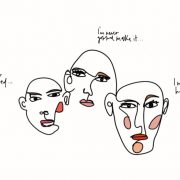When My Life Slowed to a Standstill
Written By Karen Kwek, Singapore
A lifelong scribbler, Karen enjoys the company of friends, a great cup of tea and seeing the gospel transform hearts and lives. She worked as a book editor until she and her husband traded peace and quiet for parenthood. It seemed a good idea at the time.
One moment I was standing in the middle of a room at church, and the next I was being half-carried out and sent home in a car. My right kneecap had suddenly felt too unstable to support me, as if it were about to be dislocated.
After that, I was unable to walk without crutches for about a month. But when the X-ray and MRI scans came back, the orthopedic specialist was puzzled: no pain, no signs of dislocation or other acute injury, arthritis or inflammation . . . only the joint hypermobility I’d been born with, which didn’t seem a likely cause and hadn’t troubled me since I was a teenager.
Disability is something that able-bodied people generally give little thought to, especially if no one close to us is going through such an experience. But what if all that changes overnight, and suddenly you can no longer depend on doing basic things—like walking or taking a shower—independently?
Losing My Identity?
If you’ve ever lost any of your usual functions before, you may understand how weird and alienating it feels. Apart from the questions I had for God (“What’s going on?”, “Will I ever walk unassisted again?”, “Why is this happening to me?”), I struggled to recognize myself. Glimpsing my own reflection in a mirror or the hospital’s glass panels, I had trouble accepting that the figure hobbling on crutches, sitting in a wheelchair, supporting myself on the handrails in the accessible toilet, was me! My self-concept had never included this kind of physical weakness.
Before this, I had grown accustomed to living and serving God and others in certain ways, and one key assumption in my heart (although I would never have said so) was revealed to be my confidence in my ability to “do the good works, which God prepared in advance for us to do.”
Being unable to walk meant being unable to serve my family in household tasks, or get to church or Bible study and other meetings without help. When a Christian course my teammates and I were running started up, I could only support my teammates from the sidelines—and I was forced to miss the first few sessions. I felt “useless” for the Lord, and I poured out that frustration, fear, and sadness to Him.
How God Sees Me
But God reassured me, through Ephesians 2:1-10, that my identity and worth do not depend on my physical wholeness or capabilities, any more than they depend on the things we humanly assume define us, such as family lines or ethnic distinctions. God distinguishes only between those who are dead in sin and those who are alive in Christ.
In reality, the able-bodied are not more whole; our brokenness is merely on the inside, not as visible as a limp or prosthetic limb. All of us are spiritually handicapped—by sin. On this side of heaven, even Christians are not immune to sin’s effects: human selfishness, broken relationships, emotional pain and hurt. Only Jesus can bring healing, not just to our bodies, but more importantly, to our souls.
I had been finding security and satisfaction in the “good works” I could do for the Lord with my abilities, physical and otherwise. I realized that I had become proud to serve God in ways of my own choosing and preference, rather than recognizing that I come empty-handed to wait on His will.
Grace is the fact that God gives us sinners life in Christ, for no reason other than His great love (Ephesians 2:4). He has not saved us because of the things we can do. Through Jesus’ sacrifice, God has saved us in order to be lavishly good and kind to us (Ephesians 2:6-7)—how extraordinary is that?
When did you last celebrate the fact that you are lavishly, undeservedly loved by God, and humbly praise and thank Him for His grace?
His Work, in His Strength
At present, I am thankful to be walking and running again. I do not know if or when my knee condition—or some other form of disability—may strike, just as you do not know how long your able-bodiedness or disability will last. But we can be encouraged by God’s extraordinary love for each of His children, and we can proclaim it.
You see, I had not been mistaken about the “good works . . . God prepared in advance for us”—only about where and how He would have me work. The world that opened up to me during my immobility was foreign at first, but through my experiences God provided the opportunity for conversations about faith with a new circle of people: healthcare professionals, caregivers, and fellow disability sufferers, and some of those conversations have continued up to now.
It is now about 15 months since I began physiotherapy, and doctors never did find out why I stopped being able to walk. In the end, what helped me every day was not more knowledge about my condition—it was a greater confidence in the One who enables me to endure it faithfully, to His glory.
This kind of weak dependence paradoxically gives us confidence to continue teaching and living out God’s truths even when the odds seem insurmountable: when people’s hearts seem too hard for them to turn to Jesus; when people disrespect you because they were expecting someone with strengths you don’t have; and yes, when you cannot walk or do what some other people easily can . . .
Regardless of the circumstances, are we prepared to say, “Lord, please use me in my weaknesses, to grow your Kingdom, in the ways You direct”? For just as He has prepared the work, He will most certainly carry it out according to His will, whether we are more, or less, “able”: “My grace is all you need. My power works best in weakness.” May He enable us to say, like the apostle Paul, “When I am weak, then I am strong” (2 Corinthians 12:9–10).










Leave a Reply
Want to join the discussion?Feel free to contribute!